Fifa presidential election: Key questions answered
- Published
Who will replace Sepp Blatter at Fifa?
Football's crisis-hit world governing body Fifa will meet in Zurich on Friday and elect a new leader to try to take the damaged organisation forward into a new era.
A winner must be declared on the night - as an ice hockey rink needs to be laid at midnight for a match at the same Hallenstadion venue the following day.
But what else do you need to know?
BBC Radio 5 live's sports news correspondent Richard Conway explains.
The Fifa corruption crisis explained
What will happen on Friday?
Fifa's 209 nations will gather in Zurich for what is billed as an "extraordinary congress".
It was called after Sepp Blatter dramatically announced last June that he would step aside after 18 years as Fifa president.
The 79-year-old Swiss said he was "laying down his mandate", which has led to some concern he may not have actually resigned.
However, Fifa officials are confident he will not make an awkward re-appearance - not least because he has been banned from football for eight years over a "disloyal payment" of £1.3m to suspended Uefa president Michel Platini.
Both men deny wrongdoing and are appealing against their bans.
Blatter also has no accreditation to get into the conference hall on the outskirts of Zurich where the congress is being held.
What will the congress decide?
There are two big issues to settle.
First, the FA representatives have to agree to a package of reforms designed to eliminate the problems that have plunged Fifa into crisis in recent months and restore its reputation.
Then, if and when that is formalised, they have to appoint a new president.
What are the reforms?
How to change the Fifa 'mafia'
Given the hype and spin around the election the reforms have been slightly forgotten about - but they are vitally important to the organisation's future.
One Fifa insider believes it would be a "disaster" if measures to clean up the governing body fail.
Specifically, Fifa wants members to agree to term limits for top officials along with disclosure of their salaries.
Responsibility for everyday business decisions will be removed from the "political" representatives of national associations.
The "executive committee" will be disbanded. In its place will come a new 36-member Fifa council, which will include a minimum of six women, to set global strategy.
The day-to-day running of Fifa will pass to a new "general secretariat" - equivalent to a corporate executive board - and the secretary general, effectively the CEO, will be a powerful position.
The checks and balances will be carried out by a series of committees, the most important of which will be the fully independent audit and compliance committee.
Fifa wants the regional confederations and national associations to mirror their efforts over time and they will place immediate new demands on them, such as annual audits.
Blatter and Platini bans in 60 seconds
Will the 209 nations vote in favour?
You would think so given Fifa's recent history. However, officials aren't taking any chances.
The proposals need 75% approval to be passed.
Acting president Issa Hayatou has been very active in spreading the message about the need to adopt the raft of proposals.
Hayatou was censured by the International Olympic Committee for his part in the ISL scandal - where the sports marketing company paid $100m (£66.2m) to officials, including former Fifa president Joao Havelange and ex-Fifa executive Ricardo Teixeira, in return for lucrative television and marketing rights throughout the 1990s.
Additionally, he has been accused of taking a $1.5m (£1.1m) bribe from Qatar to vote in favour of their bid to host the 2022 World Cup. Both he and Qatar categorically deny any wrongdoing.
So it is of interest that Hayatou has been at the forefront of the reform efforts.
Hayatou has an unassailable reputation (although not in Europe) amongst large sections of the 209 Fifa nations, despite his alleged wrongdoing. His voice carries weight amongst the "family" and the vote should therefore be carried without any issues.
Why would it be a 'disaster' if the reforms failed to pass?
Fifa is still in a perilous position with ongoing American and Swiss investigations into the activities of current and former officials.
As it stands, the organisation is considered a "victim" by the US Department of Justice. But that could change.
If the DoJ believes Fifa is not reforming or is carrying on as usual then it could be charged under US racketeering laws designed initially to tackle organised crime.
Passing the reforms are therefore vital if Fifa is to continue operating and not be shut down.
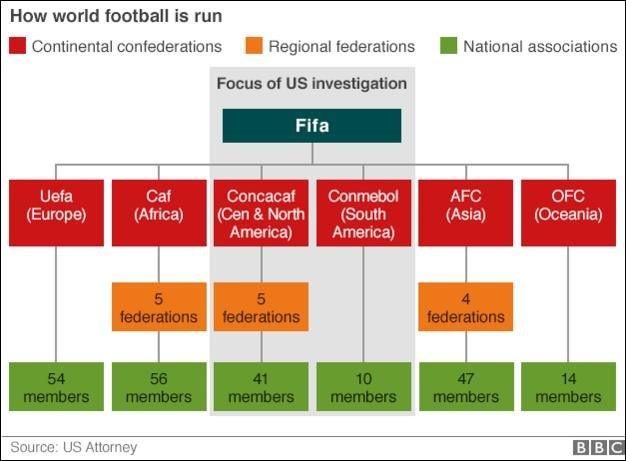
Are there other factors at play? Are future World Cups still at risk?
Yes. This is where it gets complicated.
The DoJ and the Swiss authorities are very interested in how the Russia 2018 and Qatar 2022 World Cups were awarded and if any wrongdoing took place.
If Fifa were to be shut down it could render the contracts for both those tournaments null and void.
Geopolitically that could cause huge friction, especially given the delicate military situation in Syria at the moment.
In addition, the US is a big ally of Qatar and has a strategic air base there.
Given all of this, many question whether there is the political will from President Barack Obama's administration to carry out the ultimate threat. One insider said recently he believes there is pressure on Loretta Lynch, the US Attorney General, not to act in this regard.
So no more arrests?
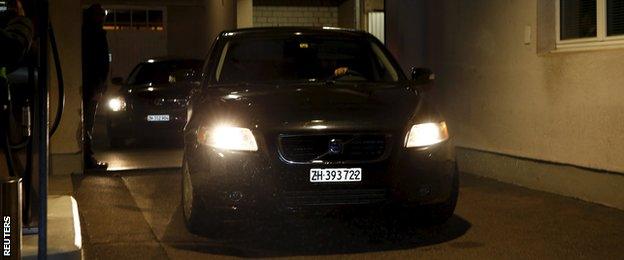
Police went to the Baur au Lac hotel in Switzerland in December
Far from it.
In December, when the US made its second wave of arrests, it issued a superseding indictment.
There are 24 unnamed co-conspirators within the document, including high ranking Fifa officials and members of national FAs. Some may be cooperating with the US already, others not.
At some stage the US will have to act and a grand jury has been sitting in the US to consider ongoing matters.
In addition, the Swiss investigation into the 2018 and 2022 bidding process is ongoing. That enquiry has widened and has resulted in Blatter being criminally investigated.
So will the US strike this week, like they did in May and December, just before Fifa meets?
Big question. No one knows right now.
If they do take action, the effect that has on the election will depend largely on who is targeted and where. The US is believed to be diverting its attention away from America and more towards Europe, Asia and Africa.
It is hard to see the mechanism by which the election could be stopped - but this is Fifa, so let's not rule anything in or out just yet.
If the election does go ahead, who is likely to win?
Sheikh Salman bin Ebrahim al-Khalifa of Bahrain is still the front runner according to many observers.
He has the backing of his own Asian confederation and Africa, though the continents do not vote as a bloc and the ballot is held in secret.
However, such political backing from two of the biggest confederations should not be underestimated.
The national associations do not want to back the loser either… even though the vote is secret. There may be big swings in the vote between the rounds.
Fifa presidency: Meet Sepp Blatter's five possible successors, external
What about GianniInfantino?
Gianni Infantino says now or never to reform Fifa
The Uefa general secretary Infantino has, according to the 45-year-old Swiss' camp, made gains in recent weeks. They believe he is the man to beat.
They would say that, wouldn't they?
Well, yes… but this is the same PR team behind Prince Ali bin al-Hussein's failed election attempt last May.
Back then they made very different noises in the build-up, briefing that 40-year-old Jordanian Prince Ali was unlikely to win but would give Blatter a bloody nose.
So their bullish confidence with Infantino should not be underestimated., external
Infantino has strong support in Europe, South America and significant backing in the potentially crucial Caribbean.
They also think they will get half the votes in Africa. If that proves true then it's game over. He wins. "If" is the key word though.
What about Prince Ali this time?
Prince Ali: Last chance to save Fifa
Prince Ali lost the support of Europe for this election when Platini announced he was standing.
He failed to make gains after the 60-year-old former France captain was banned and Infantino stepped into his shoes.
A safe prediction for Prince Ali would be that he has between 20 and 30 pledges of support.
That means he simply cannot win - but he could be a significant player in deciding the eventual victor if he drops out and asks his supporters to back a rival candidate.
What about the others?
Frenchman Jerome Champagne will stay on to the bitter end but is highly unlikely to get more than 10 votes.
South African businessman Tokyo Sexwale's efforts have been something of a mystery and he has been criticised for running a lacklustre campaign.
He went on a joint visit to Robben Island, where he was a political prisoner, with Infantino on Monday.
Despite that he says he will not quit. He seems to be playing a longer game - perhaps with his eye on a new Fifa if the current organisation is ever abolished.
How does the election work?
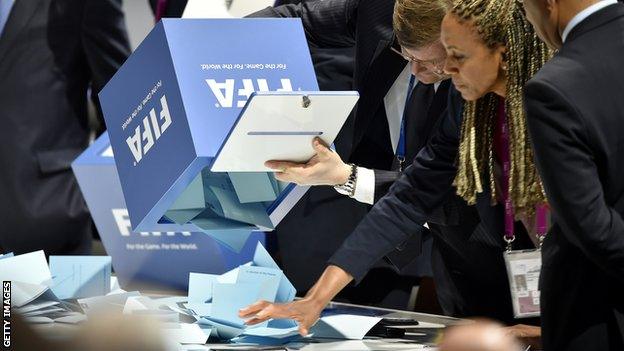
A winner must be declared on Friday
There are 207 eligible voters, with Kuwait and Indonesia currently barred from taking part.
That may change on Friday and the total number of voters will be announced before the ballot.
In the first round, the winner needs two-thirds of the available votes. If no candidate achieves that then a simple majority (105 in a 209-nation contest) is all that is required to win.
If there is still no winner then a third round will take place and the candidate with the fewest votes in round two would drop out at this point.
We could be there a while...
The candidates will each have 15 minutes to address Friday's congress, which is due to start at about 12:00 GMT.
In theory, the first round of voting should start at approximately 13:30 GMT.
Fifa estimates each round of voting will take one hour and 40 minutes. A safer bet is two hours, judging by previous elections.
So the earliest a winner is likely to be declared is about 17:30 GMT… let's see.
- Published23 February 2016
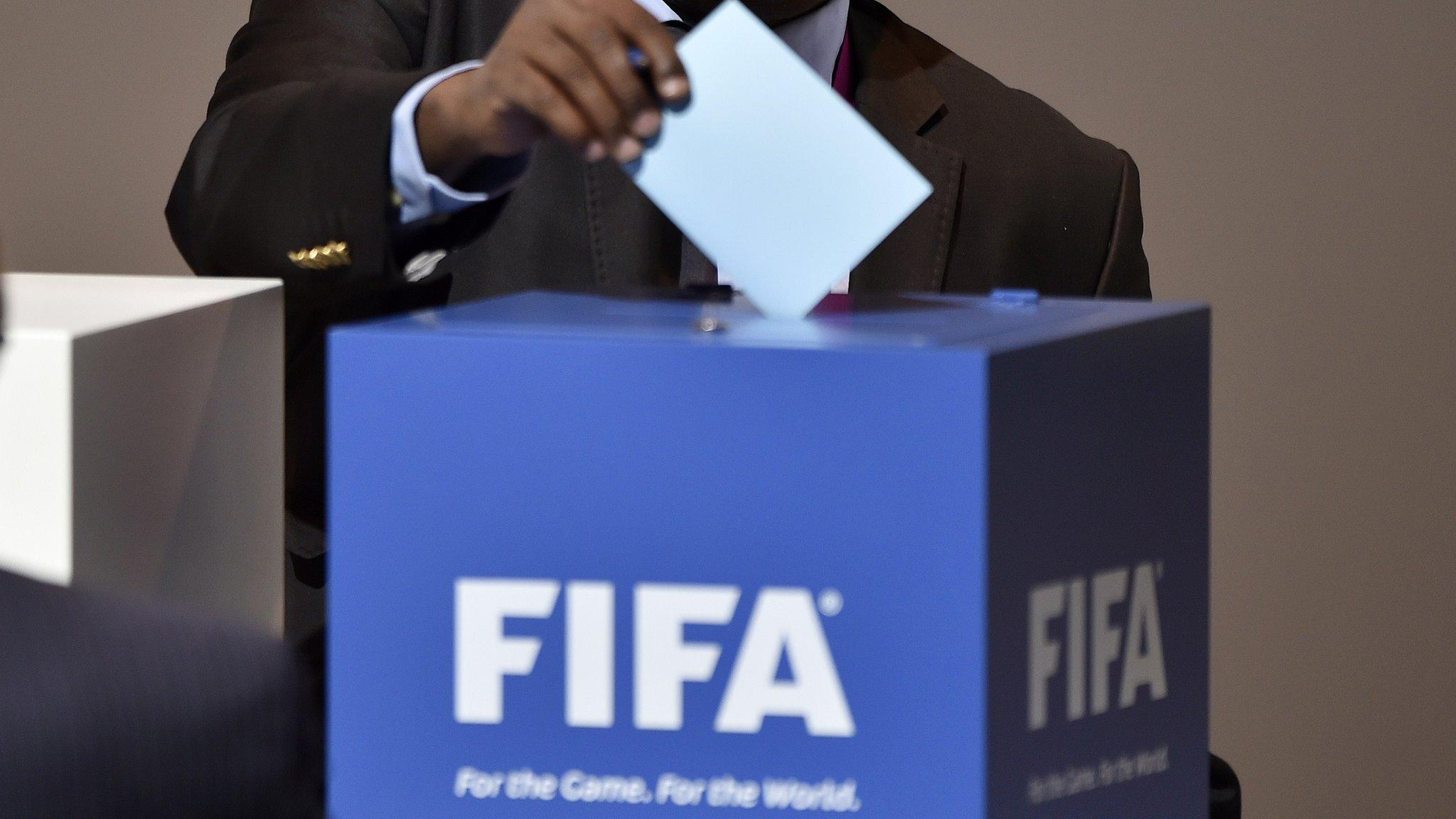
- Published23 February 2016
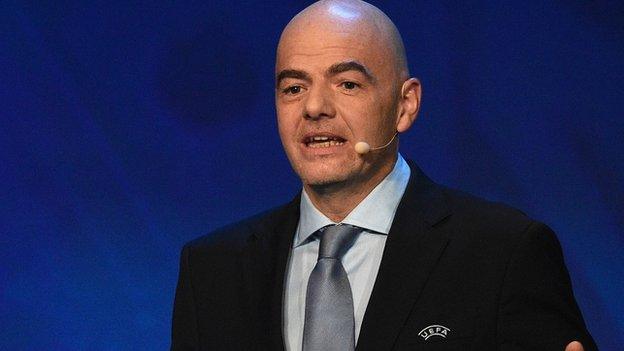
- Published23 February 2016
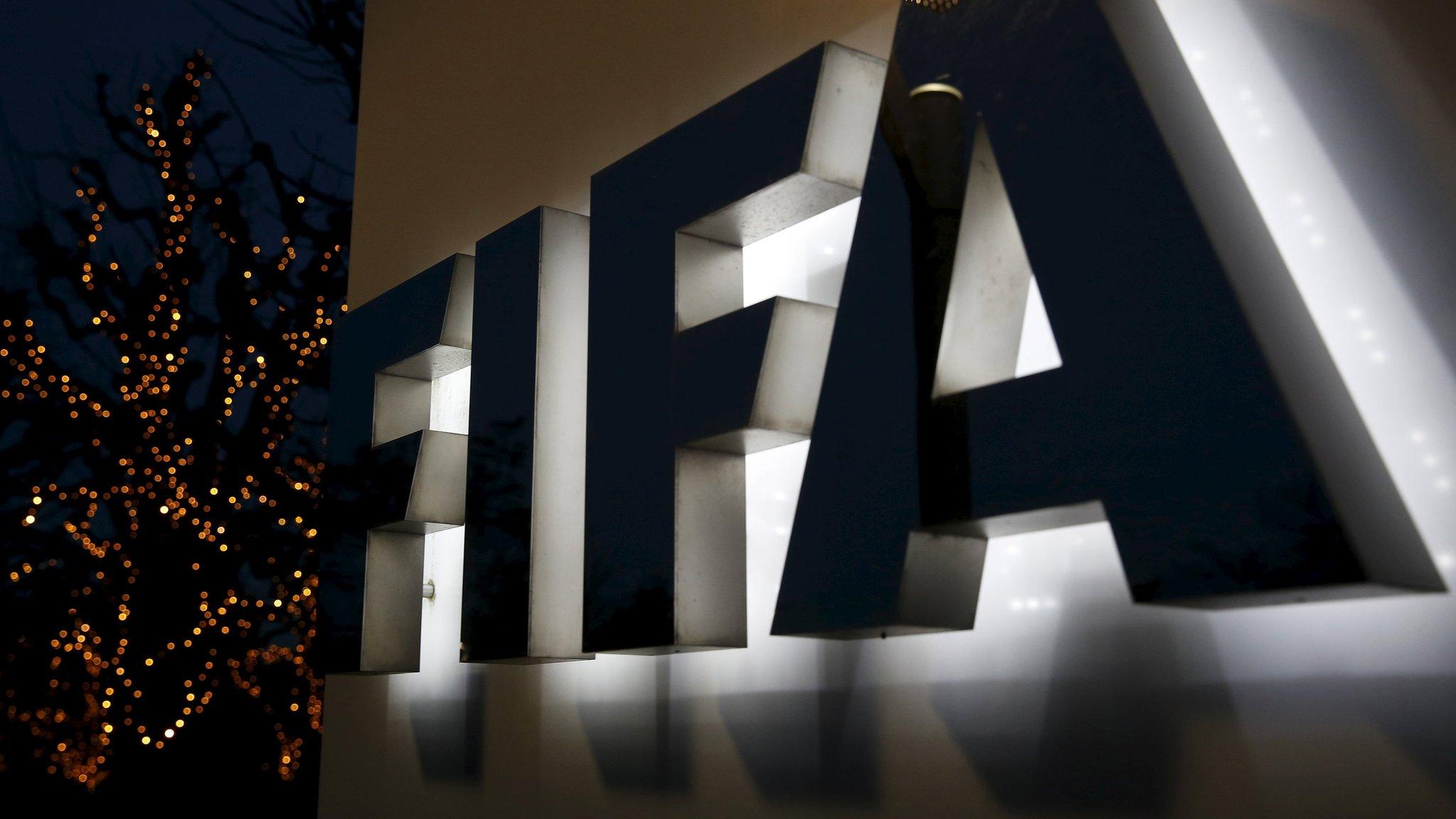
- Published2 November 2018
